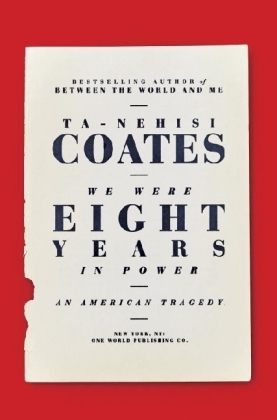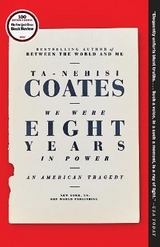
We Were Eight Years in Power
One World (Verlag)
978-0-525-51028-4 (ISBN)
- Titel erscheint in neuer Auflage
- Artikel merken
New York Times Bestseller - Finalist for the PEN/Jean Stein Book Award and the Los Angeles Times Book Prize, and the Dayton Literary Peace Prize
Named One of the Best Books of the Year by The New York Times - USA Today - Time - Los Angeles Times - San Francisco Chronicle - Essence - O: The Oprah Magazine - The Week - Kirkus Reviews
Kirkus Reviews (starred review)
"We were eight years in power" was the lament of Reconstruction-era black politicians as the American experiment in multiracial democracy ended with the return of white supremacist rule in the South. In this sweeping collection of new and selected essays, Ta-Nehisi Coates explores the tragic echoes of that history in our own time: the unprecedented election of a black president followed by a vicious backlash that fueled the election of the man Coates argues is America's "first white president."
But the story of these present-day eight years is not just about presidential politics. This book also examines the new voices, ideas, and movements for justice that emerged over this period-and the effects of the persistent, haunting shadow of our nation's old and unreconciled history. Coates powerfully examines the events of the Obama era from his intimate and revealing perspective-the point of view of a young writer who begins the journey in an unemployment office in Harlem and ends it in the Oval Office, interviewing a president.
We Were Eight Years in Power features Coates's iconic essays first published in The Atlantic, including "Fear of a Black President," "The Case for Reparations," and "The Black Family in the Age of Mass Incarceration," along with eight fresh essays that revisit each year of the Obama administration through Coates's own experiences, observations, and intellectual development, capped by a bracingly original assessment of the election that fully illuminated the tragedy of the Obama era. We Were Eight Years in Power is a vital account of modern America, from one of the definitive voices of this historic moment.
"Essential . . . Coates's probing essays about race, politics, and history became necessary ballast for this nation's gravity-defying moment."-The Boston Globe
Ta-Nehisi Coates is a national correspondent for The Atlantic. His book Between the World and Me won the National Book Award in 2015. Coates is the recipient of a MacArthur Fellowship. He lives in New York City with his wife and son.
"Biting cultural and political analysis from the award-winning journalist . . . [Ta-Nehisi Coates] reflects on race, Barack Obama's presidency and its jarring aftermath, and his own evolution as a writer in eight stunningly incisive essays. . . . He contextualizes each piece with candid personal revelations, making the volume a melding of memoir and critique. . . . Emotionally charged, deftly crafted, and urgently relevant."-Kirkus Reviews (starred review)
"Ta-Nehisi Coates has published a collection of the major magazine essays he wrote throughout the Obama years. . . . But Coates adds an unexpected element that renders We Were Eight Years in Power both new and revealing. Interspersed among the essays are introductory personal reflections. . . . Together, these introspections are the inside story of a writer at work, with all the fears, insecurities, influences, insights and blind spots that the craft demands. . . . I would have continued reading Coates during a Hillary Clinton administration, hoping in particular that he'd finally write the great Civil War history already scattered throughout his work. Yet reading him now feels more urgent, with the bar set higher."-Carlos Lozada, The Washington Post
"A master class . . . Anyone who wants to know who we are-and where we are now-must sit with [Ta-Nehisi Coates] for a good while. . . . It should inspire us as writers, and as Americans, that he urges us . . . to become better-or at least clearer on why we're not."-Kevin Young, The New York Times Book Review
"Coates . . . eloquently unfurls blunt truths. . . . Such a voice, in such a moment, is a ray of light."-USA Today
"There is a fresh clarity to [Coates's] voice-urgent, outraged, electric-that's never felt more necessary."-Entertainment Weekly
"Indispensable . . . bracing . . . compelling . . . A new book from Coates is not merely a literary event. It's a launch from Cape Canaveral."-Jennifer Senior, The New York Times
"Essential . . . Coates's probing essays about race, politics, and history became necessary ballast for this nation's gravity-defying moment." -The Boston Globe
"Coates's collection of his essays from the past decade examine the recurrence of certain themes in the black community, the need for uplift and self-reliance, the debate between liberals and conservatives about the right approach to racism, and the virulent reaction in some quarters to any signs of racial progress. . . . Coates's always sharp commentary is particularly insightful as each day brings a new upset to the cultural and political landscape laid during the term of the nation's first black president. . . . Coates is a crucial voice in the public discussion of race and equality, and readers will be eager for his take on where we stand now and why." -Booklist (starred review)
"Though the essays are about a particular period, Coates's themes reflect broader social and political phenomena. It's this timeless timeliness-reminiscent of the work of George Orwell and James Baldwin-that makes Coates worth reading again and again."-Publishers Weekly (starred review)
Chapter 1
Notes from the First Year
-
This story began, as all writing must, in failure. It was February 2007. I was seated in a state office building on 125th Street, not far from the Jamaican patty joint, not far from the fried fish spot, both of which I put to so much injudicious use in those days of conspicuous failure. I was thirty-one years old. I was living in Harlem with my partner, Kenyatta, and our son, Samori, both named for African anti-colonialists, of consecutive centuries. The names reflected a household ostensibly committed to the dream of pan-Africa, to the notion that black people here and there are united with black people then and now in a grand operatic struggle. This idea was the deep subtext of our lives. It had to be. The visible text was survivalist.
I had just lost my third job in seven years and so I'd come to that state office building for a brief seminar on work, responsibility, and the need to stay off the dole. "The dole" was small, time-limited, and humiliating to access. How anyone could enjoy or accustom themselves to it was beyond me. But the ghost of welfare reform past was strong and haunted the halls of unemployment offices everywhere. There in a classroom, amid a cohort of presumed losers and layabouts, I took my lessons in the great sin of idleness. The venue at least felt appropriate; the classroom had always been the site of my most indelible failures and losses. In the classrooms of my youth, I was forever a "conduct" problem, forever in need of "improvement," forever failing to "work up to potential." I wondered then if something was wrong with me, if there was some sort of brain damage that compelled me to color outside the lines. I'd felt like a failure all of my life-stumbling out of middle school, kicked out of high school, dropping out of college. I had learned to tread in this always troubled water. But now I felt myself drowning, and now I knew I would not drown alone.
Kenyatta and I had been together for nine years, and during that time I had never been able to consistently contribute a significant income. I was a writer and felt myself part of a tradition stretching back to a time when reading and writing were, for black people, the marks of rebellion. I believed, somewhat absurdly, that they still were. And so I derived great meaning from the work of writing. But I could not pay rent with "great meaning." I could not buy groceries with "great meaning." With "great meaning" I overdrew accounts. With "great meaning" I burned through credit cards and summoned the IRS. Wild and unlikely schemes often appeared before me. Maybe I should go to culinary school. Maybe I should be a bartender. I'd considered driving a cab. Kenyatta had a more linear solution: "I think you should spend more time writing."
At that moment, in that classroom, going through all the mandated motions, I could not see it. I could not see anything. And like almost every other lesson administered to me in a classroom, I don't remember a single thing said that day. And as with all the other buried traumas accumulated in the classrooms, I did not allow myself to feel the ache of that failure. Instead, I fell back on the old habits and logic of the street, where it was so often necessary to deny humiliation and transmute pain into rage. So I took the agony of that era like a collection notice and hid it away in the upper dresser of the mind, resolved to return to it when I had means to pay. I think now, today, I have settled almost all of those old accounts. But the ache and aftershock of failure remain long after the drawer is bare.
I can somehow remember all that I did not allow myself to feel walking away from the unemployment office and through the Harlem streets that day, just as I remember all that I did not let myself feel in those young years trapped between the schools and the street. And I know that there are black boys and black girls out there lost in a
| Erscheinungsdatum | 20.09.2017 |
|---|---|
| Sprache | englisch |
| Maße | 157 x 233 mm |
| Gewicht | 509 g |
| Themenwelt | Sachbuch/Ratgeber ► Geschichte / Politik ► Politik / Gesellschaft |
| Sozialwissenschaften ► Politik / Verwaltung | |
| Schlagworte | activism • American Culture • American Government • American Politics • american president • barack obama • culture essays • current affairs essays • Discrimination • Essays • Mass Incarceration • modern presidency • Obama, Barack • Political activism • Political culture • Political Discourse • political essays • Political Science • Politics • presidency • Race relations • Racism • reparations • United States government • USA; Politik/Zeitgesch. • USA; Politik/Zeitgeschichte |
| ISBN-10 | 0-525-51028-1 / 0525510281 |
| ISBN-13 | 978-0-525-51028-4 / 9780525510284 |
| Zustand | Neuware |
| Haben Sie eine Frage zum Produkt? |
aus dem Bereich



